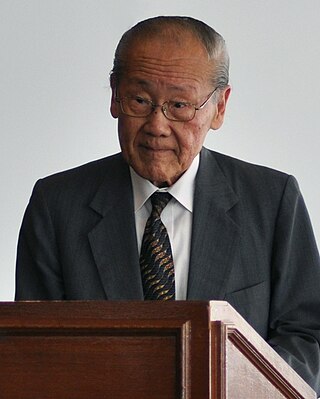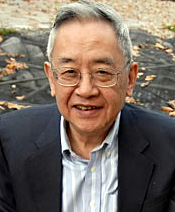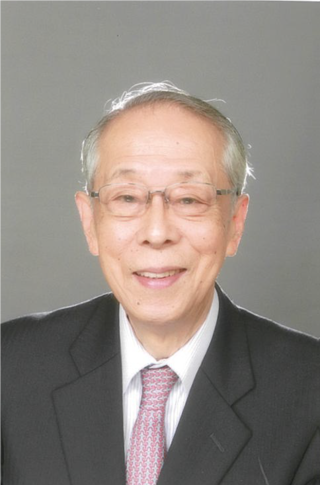Related Research Articles

Wang Gungwu, is an Australian historian, sinologist, and writer specialising in the history of China and Southeast Asia. He has studied and written about the Chinese diaspora, but he has objected to the use of the word diaspora to describe the migration of Chinese from China because both it mistakenly implies that all overseas Chinese are the same and has been used to perpetuate fears of a "Chinese threat", under the control of the Chinese government. An expert on the Chinese tianxia concept, he was the first to suggest its application to the contemporary world as an American Tianxia.

Duke Huan of Qi, personal name Xiǎobái (小白), was the ruler of the State of Qi from 685 to 643 BC. Living during the chaotic Spring and Autumn period, as the Zhou dynasty's former vassal states fought each other for supremacy, Duke Huan and his long-time advisor Guan Zhong managed to transform Qi into China's most powerful polity. Duke Huan was eventually recognized by most of the Zhou states as well as the Zhou royal family as Hegemon of China. In this position, he fought off invasions of China by non-Zhou peoples and attempted to restore order throughout the lands. Toward the end of his more than forty-year-long reign, however, Duke Huan's power began to decline as he grew ill and Qi came to be embroiled in factional strife. Following his death in 643 BC, Qi completely lost its predominance.
Dame Jessica Mary Rawson, is an English art historian, curator and sinologist. She is also an academic administrator, specialising in Chinese art.

Yu Ying-shih was a Chinese-born American historian, sinologist, and the Gordon Wu '58 Professor of Chinese Studies, Emeritus, at Princeton University. He was known for his mastery of sources for Chinese history and philosophy, his ability to synthesize them on a wide range of topics, and for his advocacy for a new Confucianism. He was a tenured professor at Harvard University and Yale University before his time at Princeton.

Chih-Tang "Tom" Sah is a Chinese-American electronics engineer and condensed matter physicist. He is best known for inventing CMOS logic with Frank Wanlass at Fairchild Semiconductor in 1963. CMOS is used in nearly all modern very large-scale integration (VLSI) semiconductor devices.

Ch'ien Mu or Qian Mu was a Chinese historian, philosopher and writer. He is considered to be one of the greatest historians and philosophers of 20th-century China. Ch'ien, together with Lü Simian, Chen Yinke and Chen Yuan, was known as the "Four Greatest Historians" of Modern China (現代四大史學家).
Early and Medieval Chinese History, in Chinese《早期中國史研究》, abbreviated EMCH, is a Chinese-language academic journal on the study of Ancient and Medieval China, published by the Society of Early and Medieval Chinese History,.

The Tang Prize is a set of biannual international awards bestowed in four fields: Sustainable Development, Biopharmaceutical Science, Sinology, and Rule of Law. Nomination and selection are conducted by an independent selection committee, which is formed in partial cooperation with the Academia Sinica, Taiwan's top research institution.
Li Feng, or Feng Li, is a professor of Early Chinese History and Archaeology at Columbia University, where he is director of graduate studies for the Department of East Asian Languages and Culture. He received his MA in 1986 from the Institute of Archaeology, Chinese Academy of Social Sciences, and his Ph.D. in 2000 from the University of Chicago. He also did Ph.D. work in the University of Tokyo (1991). He is both a field archaeologist and an historian of Early China with primary interest in bronze inscriptions of the Shang-Zhou period. Li founded the Columbia Early China Seminar in 2002, and directed Columbia's first archaeological field project in China, in the Shandong Peninsula, in 2006–2011.
I Lo-fen is a Taiwanese scholar and writer. She received her Chinese Literature Ph.D. from National Taiwan University. She has been an associate professor in the Division of Chinese in Nanyang Technological University’s School of Humanities and Social Sciences since July 2006, and was the Head of the Division (2014-2016). She had formerly committed in institutes like the National Taiwan University, Tamkang University, Fu Jen Catholic University, and the Institute of Chinese Literature and Philosophy at Academia Sinica. In addition, she was also a visiting professor at Stanford University in the United States and East Asian Institute at Sungkyunkwan University, South Korea. Her research expertise lies in Text and Image Studies, Su Shi studies, East Asian literature and intercultural exchanges in Classical Chinese, and Singapore literature, history, and arts studies. She is also a board member of the China Su Shi Studies Society, and an international board member of the Korea Society of East Asian Comparative Literature. She is the Founder and Honorary President of the "Text and Image Studies Society"(文图学会) that was official registered in Singapore on 18 December 2017. By integrating the history of Chinese literature and arts, she has accomplished a series of researches on poems in paintings and poetic imagery. She then proposed the idea of the “Text and Image Studies”(文图学) and focused on the relations, comparison and intertextuality between poems and paintings. From there, she has established her literary theory in arts creation and culture of aesthetics. She is also a column writer of Singapore Lianhe Zaobao (2007-), and she hosts podcast "Lofen says".

Chen Chien-jenOS KSG KHS is a Taiwanese epidemiologist and politician who served as Vice President of Taiwan from 2016 to 2020 and premier of Taiwan from 2023 to 2024 under President Tsai Ing-wen. He joined the Chen Shui-bian presidential administration in 2003 as leader of the Department of Health, serving through 2005. He later headed the National Science Council between 2006 and 2008. Chen then served as a vice president of Academia Sinica from 2011 to 2015. Later that year, Chen joined Tsai Ing-wen on the Democratic Progressive Party presidential ticket and served as Vice President of Taiwan from 2016 to 2020. Chen joined the DPP in 2022 and was appointed premier in January 2023.

Olga Gorodetskaya, also known as Kuo Ching-yun, is a Soviet-born Taiwan-based historian, known mostly for her research into early Chinese history and archaeology. Olga Gorodetskaya is the author of a contemporary book on Ancient Chinese history, Xia, Shang, Zhou Dynasties: from Myths to Historical Facts. The book and as a result its author are a subject of considerable controversy within the Sinological academia, especially so within the People's Republic of China.

Xu is a Chinese surname. In the Wade-Giles system of romanization, it is romanized as Hsu, which is commonly used in Taiwan.

Yoshinobu Shiba is a retired Japanese historian of China and professor emeritus of Osaka University, who specializes in Song dynasty history. A member of the Japan Academy, he has received the Order of Culture, Order of the Sacred Treasure, and Person of Cultural Merit in Japan. In 2018, he jointly received the Tang Prize in Sinology with Stephen Owen, "for his mastery and depth of insight in Chinese social-economic history achieved through his original theoretical lens that fuses the distinctive fortes of Chinese, Japanese, and Western scholarship."

Chang Chun-yen was a Taiwanese academic administrator and electrical engineer who served as President of National Chiao Tung University (NCTU).
Chen Zhi is a Chinese scholar and researcher in classical Chinese Studies, the Provost of Beijing Normal University-Hong Kong Baptist University United International College (UIC) and Director of the Jao Tsung-I Academy of Sinology (JAS) at Hong Kong Baptist University.
This is a family tree of Chinese monarchs during the Spring and Autumn period.
Chou Chang-hung is a Taiwanese botanist and plant ecologist. He has been elected a fellow of The World Academy of Sciences and an academician of Academia Sinica.
References
- 1 2 Chung, Yu-chen; Yeh, Joseph (20 June 2024). "TANG PRIZE/Historian Hsu hopes to inspire next generation with Tang Prize honor". Central News Agency. Retrieved 21 June 2024.
Born in 1930 in Xiamen City, China, Hsu and his family moved to Taiwan in 1948, one year before the end of the Chinese Civil War in 1949.
- ↑ 2004 Winner of Distinguished Contributions to Asian Studies Award 2004 from Association for Asian Studies (AAS)
- ↑ "Cho-yun Hsu | Carnegie Council for Ethics in International Affairs".
- ↑ "Cho-Yun Hsu". Academia Sinica. Retrieved 19 September 2023.
- ↑ Yeh, Joseph (20 June 2024). "TANG PRIZE/Taiwanese-American historian Hsu Cho-yun wins Tang Prize in Sinology". Central News Agency. Retrieved 21 June 2024. Republished as: "Hsu Cho-yun awarded Tang Prize in Sinology". Taipei Times. 21 June 2024. Retrieved 21 June 2024.
- ↑ Ancient China in Transition: An Analysis of Social Mobility, 722–222 B.C. at Google Books